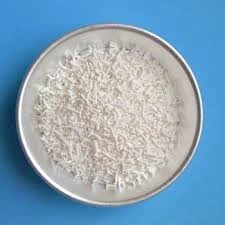
preservatives for baked goods
Preservatives for Baked Goods Ensuring Freshness and Safety
In the world of baking, achieving the perfect balance between taste, texture, and shelf life is crucial. As anyone who has indulged in freshly baked bread or pastries knows, these delights often have a short lifespan. To combat spoilage and maintain quality, preservatives play a vital role in the baking industry. This article will explore the types of preservatives commonly used in baked goods, their benefits, and considerations for both manufacturers and consumers.
Understanding Preservatives
Preservatives are substances added to food products to prevent spoilage caused by microorganisms, oxidation, and chemical changes. In baked goods, preservatives help maintain freshness by extending shelf life, preventing mold growth, and delaying staleness. There are two primary categories of preservatives natural and synthetic.
Natural Preservatives
Natural preservatives, often derived from plant sources or fermentation processes, are becoming increasingly popular among health-conscious consumers. Some common natural preservatives include
- Vinegar Acetic acid in vinegar can inhibit mold growth and enhance flavor, making it ideal for sourdough bread. - Honey Known for its antimicrobial properties, honey can help keep baked goods fresher for longer. - Rosemary Extract Rich in antioxidants, this herb not only adds flavor but also acts as a natural preservative, particularly in savory baked goods.
Natural preservatives are often perceived to be healthier, as they do not contain artificial chemicals
. However, their effectiveness can vary based on the type of baked good and the specific conditions of storage.Synthetic Preservatives
preservatives for baked goods

Synthetic preservatives have been a staple in the baking industry for decades. They are typically more potent and effective than natural alternatives, allowing for longer shelf life without compromising taste or texture. Some common synthetic preservatives include
- Calcium Propionate Frequently used in bread, calcium propionate prevents mold and bacterial growth. It is recognized as safe by food safety authorities and is commonly found in commercial baked goods. - Sodium Benzoate Often used to preserve sweet baked goods like cakes and pastries, sodium benzoate acts as a barrier against spoilage. - Potassium Sorbate A widely used preservative that prevents yeast and mold growth, potassium sorbate is found in various baked products, ensuring they remain fresh longer.
While synthetic preservatives offer longevity, they often come under scrutiny regarding potential health concerns. Some consumers prefer to avoid products with additives, leading to a shift toward cleaner labels in the baking industry.
Consumer Considerations
When it comes to choosing baked goods, awareness of preservatives is essential for consumers. Many people today are more health-conscious and prefer products with fewer artificial additives. As a result, many manufacturers are reformulating their recipes to include natural preservatives and promote organic or non-GMO labels.
It's also important for consumers to understand that not all preservatives are harmful. Regulatory agencies such as the FDA monitor the use of ingredients in food products, ensuring that approved preservatives are safe for consumption.
Conclusion
Preservatives play a critical role in the shelf life and safety of baked goods. With a growing demand for healthier options, both manufacturers and consumers are navigating the balance between freshness and natural ingredients. Whether opting for traditional synthetic preservatives or embracing natural alternatives, the ultimate goal remains the same to enjoy delicious, safe, and fresh baked goods. As the conversation around food preservation continues to evolve, consumers can make informed choices that align with their values and preferences.
-
Pure Sodium Dichloroisocyanurate Dihydrate | Powerful DisinfectantNewsAug.29,2025
-
Industrial Chemicals: Quality & Purity for Every IndustryNewsAug.28,2025
-
Nitrile Rubber Honoring Strict Production StandardsNewsAug.22,2025
-
Aspartame Ingredients Honoring Food Safety ValuesNewsAug.22,2025
-
Fertilizer for Balanced Plant NutritionNewsAug.22,2025
-
Cyanide Gold Processing with High Purity AdditivesNewsAug.22,2025
-
Formic Acid in Textile Dyeing ApplicationsNewsAug.22,2025
Hebei Tenger Chemical Technology Co., Ltd. focuses on the chemical industry and is committed to the export service of chemical raw materials.
-

view more DiethanolisopropanolamineIn the ever-growing field of chemical solutions, diethanolisopropanolamine (DEIPA) stands out as a versatile and important compound. Due to its unique chemical structure and properties, DEIPA is of interest to various industries including construction, personal care, and agriculture. -

view more TriisopropanolamineTriisopropanolamine (TIPA) alkanol amine substance, is a kind of alcohol amine compound with amino and alcohol hydroxyl, and because of its molecules contains both amino and hydroxyl. -

view more Tetramethyl Thiuram DisulfideTetramethyl thiuram disulfide, also known as TMTD, is a white to light-yellow powder with a distinct sulfur-like odor. It is soluble in organic solvents such as benzene, acetone, and ethyl acetate, making it highly versatile for use in different formulations. TMTD is known for its excellent vulcanization acceleration properties, which makes it a key ingredient in the production of rubber products. Additionally, it acts as an effective fungicide and bactericide, making it valuable in agricultural applications. Its high purity and stability ensure consistent performance, making it a preferred choice for manufacturers across various industries.





